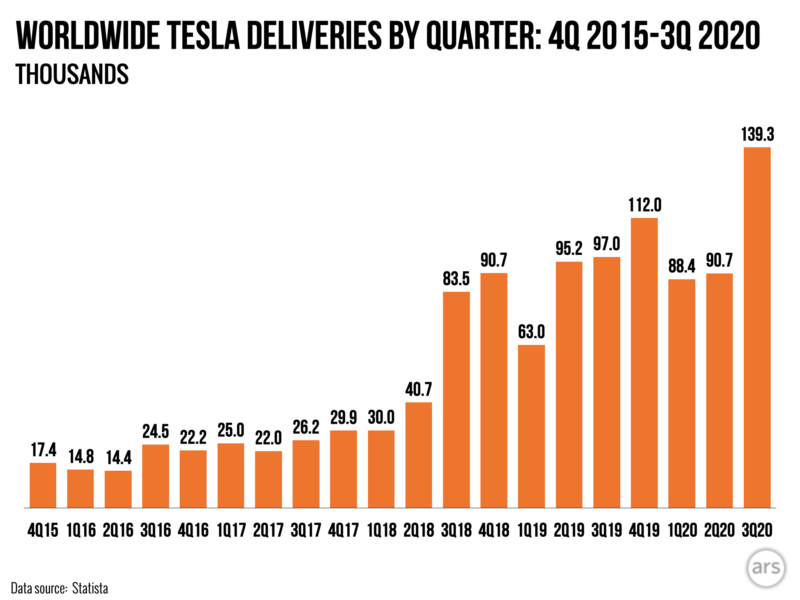Tesla delivers 140,000 vehicles, smashing previous records

In recent months, Tesla skeptics have argued that the company’s growth had stalled. After delivering a record-breaking 83,500 vehicles in the third quarter of 2018, the company’s deliveries grew only modestly in the next few quarters: 97,000 in the third quarter of 2019, for example, and 90,650 in the second quarter of 2020.
But Tesla’s Q3 2020 numbers, released Friday morning, put those concerns to rest. Tesla says it shipped 139,300 vehicles in the third quarter of 2020. That’s up 53 percent from last quarter and up 45 percent from a year earlier. It’s also up 24 percent from Tesla’s previous best quarter—the fourth quarter of 2019.
The number slightly exceeded the consensus forecast of Wall Street analysts, but Tesla’s stock still fell about 3 percent in Friday morning trading.
The jump in Tesla deliveries presumably reflects the opening of Tesla’s new factory in Shanghai around the start of the year. If not for the coronavirus, Tesla might have achieved record-breaking numbers in the first and second quarters. But Tesla had to briefly shutter the Shanghai factory in the first quarter, and the Fremont factory was closed from late March through mid May. So the third quarter was the first time both factories were operating throughout a quarter.
Rapid growth is important for Tesla to justify its astronomical stock value. Wall Street values Tesla at more than $400 billion—more than the combined market values of GM, Ford, Volkswagen, and Toyota. That’s despite the fact that those companies each make millions of cars per year, while Tesla delivered only 367,500 in 2019.
At the start of the year, before the extent of the COVID-19 pandemic was known, Tesla said it was aiming to deliver 500,000 vehicles this year. So far this year, Tesla has delivered 318,000 vehicles. Tesla would need to deliver more than 180,000 vehicles in the fourth quarter to hit the target.
Tesla is laying the groundwork for rapid growth over the next two years, with plans to open additional factories in the Berlin area and near Austin, Texas. Those factories will support Tesla’s expanding line of vehicles, including this year’s new Model Y and the forthcoming Cybertruck, Semi, and new Roadster.
Tesla continues to see lackluster sales of its high-end Model S sedan and Model X SUV. In the third quarter of 2020, Tesla sold only 15,000 of the pricey vehicles. That’s a lot less than the 27,000 S and X vehicles Tesla sold two years earlier. This likely reflects the fact that these vehicles haven’t had a major refresh since they were introduced in 2012 and 2015, respectively. The newer and cheaper Model 3 and Model Y may be cannibalizing their sales.
Tesla plans to introduce a new high-end Model S called the Model S Plaid next year. It will start at $139,900, making it significantly more expensive than the current Model S.
https://arstechnica.com/?p=1711247